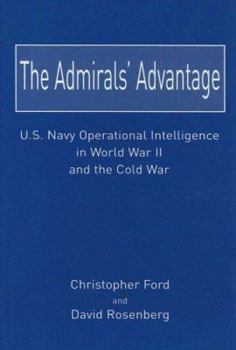The Admirals' Advantage: U.S. Navy Operational Intelligence in World War II And the Cold War
Select Format
Select Condition 
Book Overview
Operational intelligence, knowledge of the enemy's location and actions, is crucial to effective military operations. The Admirals' Advantage offers a revealing look at naval operational intelligence... This description may be from another edition of this product.
Format:Hardcover
Language:English
ISBN:1591142822
ISBN13:9781591142829
Release Date:January 2005
Publisher:US Naval Institute Press
Length:219 Pages
Weight:0.60 lbs.
Dimensions:0.8" x 6.4" x 9.3"
Customer Reviews
2 ratings
OPINTEL
Published by Thriftbooks.com User , 17 years ago
An excellent addition to the literature on US Navy Intelligence through the years. As you read through this account, taken from many flag officer and senior civilian interviews, you can understand why the USN has put so many of its Intelligence Flag officers in prominent positions in the intelligence community: world view; big picture; strategic thinking.
Intelligence in the Cold War as Leading to the Future
Published by Thriftbooks.com User , 19 years ago
The stories of intelligence gathered from Signal Intelligence in World War II are well known. The development of ULTRA and MAGIC gave the Allied Admirals a significant advantage in the battles of the Atlantic and of course at Midway. This was really the start of intelligence moving from a dead end career to a position of some prominence in the Navy world. This book gives a bit about the history of operational intelligence during World War II but is mostly about the development of Naval operational intelligence after the end of the war. Our intelligence agencies took a hit in the aftermath of 9/11. Perhaps there was still too much orientation to the Cold War. Perhaps there was no orientation at all, just continuing business as usual. This book concludes with a chapter called Transition, Refocus, and the Future. This covers the time vrom the Goldwater-Nichols Bill which restructured the U.S. military command structure into a series of worldwide joint-service regional and functional commands. In the jargon of the services, many functions like OPINTEL went "Purple," that is no more concentration on the White uniforms of the Navy, the Blue of the Air Force, or the Green of the Army. The change isn't complete, but experience has shown that an understanding of the past and the capabilities that were built up are the base upon which the organization of the future is built. The book is dedicated to the eighe Naval Intelligence shipmates who died in the Pentagon on September 11, 2001.






